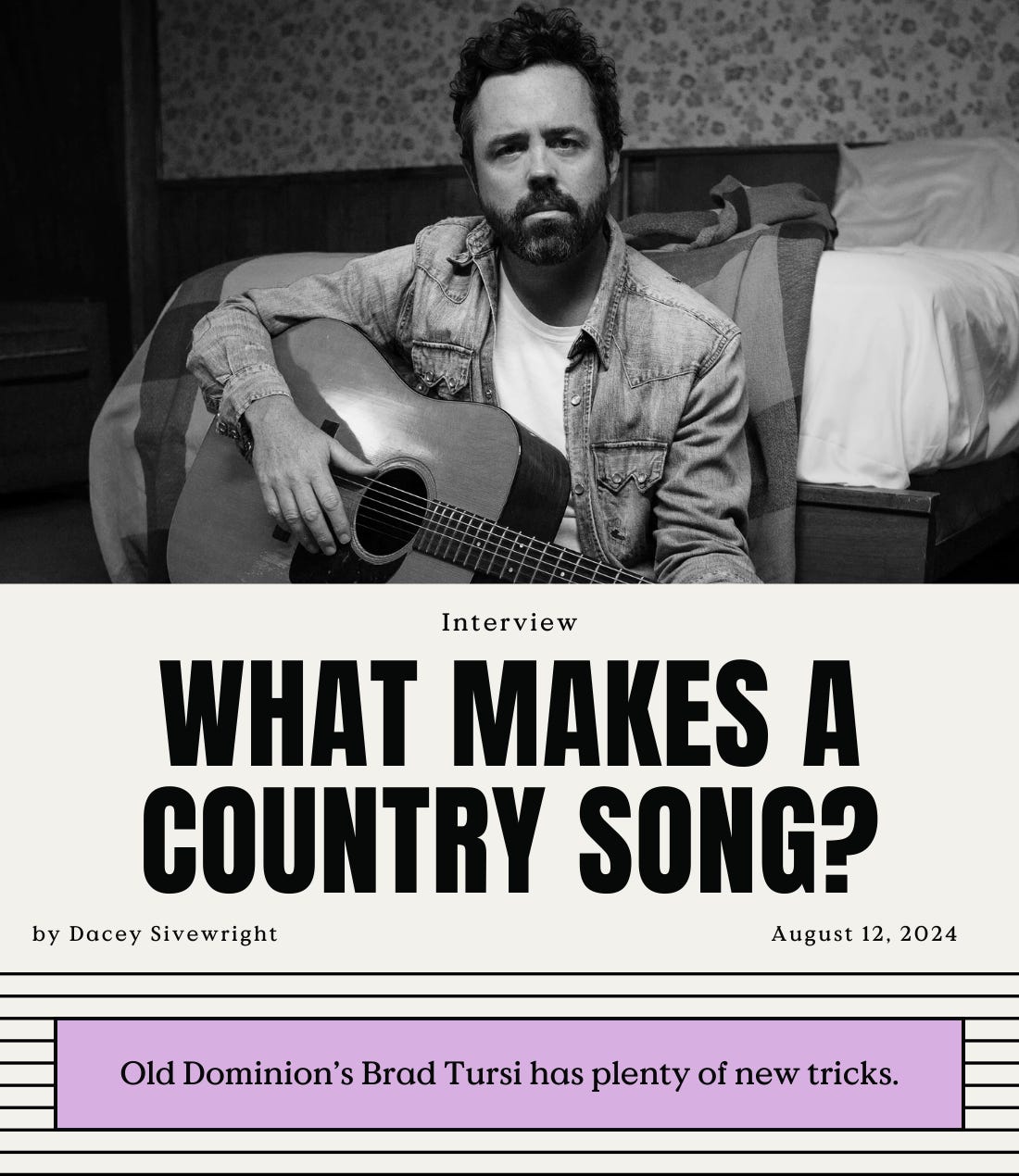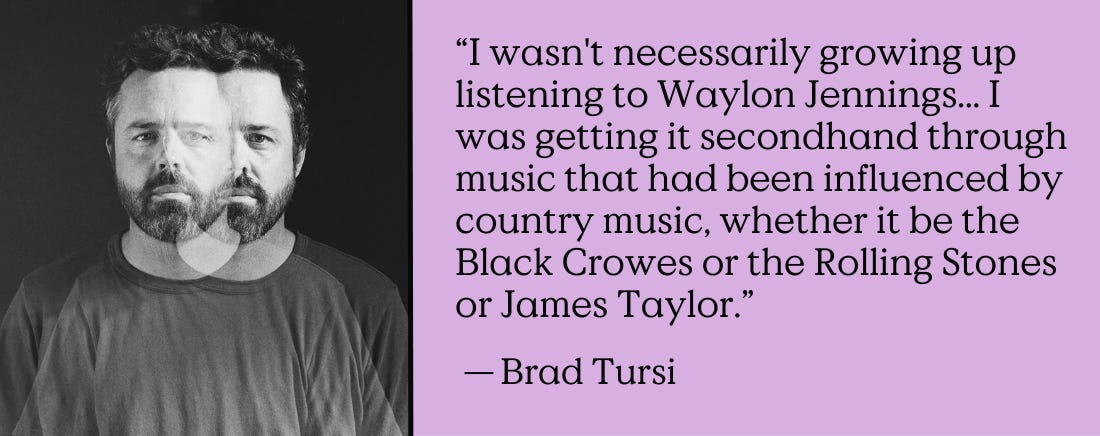Brad Tursi is a singer, a songwriter, and a guitarist. But for most of his career, he’s been best known as one part of a larger musical whole. "Honestly, since I was 15 years old, I was never not in a band,” he laughs. As lead guitarist of hit-making country group Old Dominion – yes, the one that’s been nominated for a Grammy, won 3 ACM Awards, and churns out radio hits with stunning regularity – Tursi has played to enormous crowds all over the world. He’s co-written songs for other country artists, too, from Luke Bryan's "Light It Up" to Kenny Chesney's "Save It For a Rainy Day."
But as Tursi gears up for the release of his debut solo album, Parallel Love, the future feels especially exciting. "This is a long, long time coming as far as being the guy that's singing the songs,” he jokes. The album, which features co-writes with Dan Isbell, Jessi Alexander, Matt Jenkins, Ben West, and Stephen Wilson Jr., is a collection of songs written across the last decade. Produced by Tursi and Marc Scibilia, Parallel Love showcases Tursi’s artistic versatility alongside his strong vocal and songwriting chops – with a sound that might surprise even longtime fans of Tursi’s work with Old Dominion.
"I always thought it would be harder to do all this by myself, but there's a certain ease to it that I didn't expect,” he says. "I get to follow my own muse all the time. And I don't have to really ask anyone if that's okay."
Here, Good Country catches up with Tursi about his upbringing with music, what makes a country song, and the special kind of kinship that inspired Parallel Love.
Knowing your history as a writer and band member, there’s so much to unpack on the title track, “Parallel Love.” How did that one come together?
Brad Tursi: I wrote the song with Dan Isbell, who's just a great buddy and very country salt-of-the-Earth guy. He brought the right amount of country to it. Trannie Anderson is another co-writer of mine; she didn't write the song, but I asked her to come over and sing it 'cause I liked her voice. So she came over and graced the track with her vocals.
I read about the concept [of parallel love] in one of those self-help books or whatever. When two people are in a relationship, sometimes your tendency is to latch on to each other, to try to be each other's everything. And it's a little bit unrealistic. This concept is more about two people together who are growing in a parallel way: sometimes you're going to be together, sometimes you're going to be separate, but you're always there to support each other. You're remaining your own person while you're next to this other person.
After a while I was trying to figure out what to call it. I thought, "Man, that theme runs through everything..." The record is basically about myself, being a musician, being a friend, being in an intimate relationship. And I think you can grow in a parallel way in all those things. Friends come and go; even old friends stay together and drift apart and drift back together. Music bands fluctuate, too. So I thought "Parallel Love" was a nice way to stamp the whole thing.
You said that Dan Isbell "brought the right amount of country." Plenty of your songs exist outside of a cookie-cutter genre sound, but they're definitely country. What, to you, makes a country song?
I think it depends. I think you see a lot of emphasis is put on the lyric in some country songs – it's one of those things that's usually very understandable. There's not a lot of vagueness in it, which I think country music is like that. I used to try, when I first moved to town, to write the songs about cornfields and stuff, but I can't do it. That's real life for plenty of folks, and you can't fool people as writers. So I try to not do that kind of thing – unless I'm with someone in the room like Dan Isbell, who I could be like, "Is that right? Is that how we're supposed to say that?"
I wouldn't say modern country is necessarily defined by its instrumentation or sounds, because there are so many different [styles]. There's trap beats, there's rock, there's all kinds of stuff. But when I think of Willie Nelson or even a Sturgill Simpson or Dwight Yoakam, those are the acts that I feel sonically encapsulate more of a pure form of it, to me. They've got these great lyrics, but it’s also just very recognizable country instrumentation and sound – the sound of the guitars and the delivery of the vocal.
But you've played and written so many songs that I feel like are certainly country songs, and they definitely diverge from that.
Well, yeah. I wasn't necessarily growing up listening to Waylon Jennings or whatever. I was getting it secondhand through music that had been influenced by country music, whether it be the Black Crowes or the Rolling Stones or James Taylor. I was in a lot of rock bands. So that's the angle that I'm coming to country music from.
Tell me more about that; what were your earliest memories with music?
The first song I remember hearing was "Blue Sky." I was in the car, and I remember asking my mom, "Who is this, what is this?" She was like, "This is The Allman Brothers." That was a big influence on me. I got super into Guns N' Roses, and then I started getting into James Taylor and a lot of Southern rock. And so those were my big influences growing up for sure.
I found my dad's acoustic guitar in the attic when I was 13. It's the same one I'm looking at right now; I just got it repaired. I was up in the attic – one of those attics where you have to take down the door from the ceiling and the stairs come down and you walk up this weird, old space. I opened it up in this crazy red velvet case, and from that day on I never put it down. I was obsessed with it.
You’ve come a long way since then. Why is now the right time for a solo album?
Over the years, there've been so many songs that I've written that I just knew weren't quite for the band. They're just more my style: a little more singer-songwriter-y, little more mellow. Some of them have been hanging around for 10 years and some of them are a little bit more current. But at this point, because of the band's success, I finally had the ways and means to just pay for the record myself – to record it and take my time, and that was nice. It was really just a passion project. I handed it to the management and the label and they asked what I wanted to do with it. I said, "Honestly, I didn't have a plan. If you didn't like it, that was the end. I was going to just send it to my mom and call it a day."
Having collected these songs over so many years, how did you actually record them?
There were three different iterations. "Church Bells and Train Whistles" was just a song that I wrote with Ben West and Stephen Wilson, Jr. Ben West made that recording as a demo and that song got pitched around town, but no one ended up ever recording it. I actually even sent it to the Old Dominion guys, but they didn't want to record it. I just always loved that song so much, loved the recording so much that I didn't even do anything to it – I just mixed the demo that he made.
Two of the songs, "Question the Universe" and "Afraid to Lose," I did with Marc Scibilia, who's a great musician-producer. He's got this crazy home studio, and he's like a mad scientist in there. So we did two of the songs, just him and I. I played acoustic guitar and piano and sang them, and one of his buddies played drums on one of the songs, but he played pretty much every other instrument on those.
The other songs I recorded at Sound Emporium in Nashville. I had some amazing session players that I've known for a long time and who I've played with on all kinds of records. It was more of a live setting, all sitting there in the studio playing together.
When people listen to this album, what do you hope that they take away from it?
Well, it's funny 'cause I think a lot of times you think to yourself, for some reason, that people know what you sound like or know what you do. But they don't. They just know me from that band. People that have said to me, "Ah, it doesn't sound like Old Dominion." And I'm like, "Yeah. Because it's not." But I hope that they're pleasantly surprised. I hope they enjoy it, and just like the Old Dominion stuff, I hope that it will become part of people's lives – that people get to say, "Oh, this is our song." I'm excited to get out there and have this new little path to walk down.
Lead Image: Brad Tursi by Marina Chavez.






